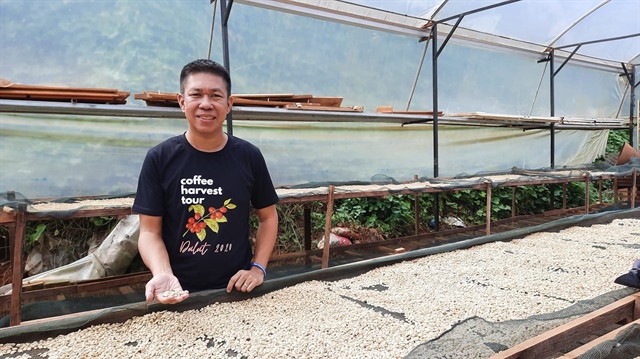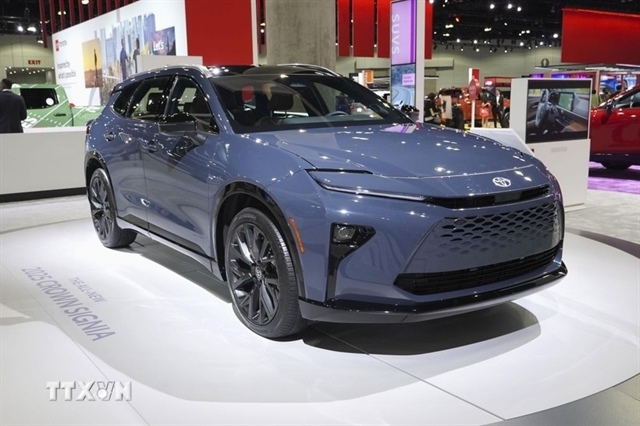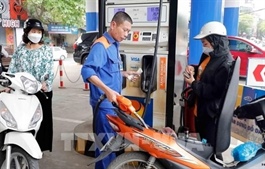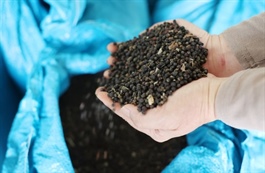This man brings Vietnam, Philippines closer together, one coffee bean at a time
This man brings Vietnam, Philippines closer together, one coffee bean at a time
Arnold Cadag, 45, occasionally spends his days guiding his fellow Filipinos through specialty coffee shops in Ho Chi Minh City, introducing customers to coffee beans, their origins, and flavor notes.

Arnold Cadag poses in a supplied photo taken during his trip to a coffee market in Da Lat, the capital city of Lam Dong Province in Vietnam's Central Highlands. |
Known for his deep knowledge of coffee, Cadag’s coffee tours and classes have become quite popular amongst Filipinos.
When he is not busy savoring a cup of joe, he is hard at work serving as the co-founder of KembaQ Tech, a mobile application that helps businesses grow their client base.
He also works as a consultant at Bridge, a business development consulting and marketing services company specializing in instant coffee and sustainable products.
Outside of the jobs, Cadag’s life revolves around coffee and his Pinoy Coffee Club VN – a community for Filipino coffee enthusiasts in Ho Chi Minh City, where he has lived for six years.
He also has partnerships with ten coffee farms in Lam Dong and Kon Tum, both located in Vietnam's Central Highlands, to export coffee to his customer base in the Philippines.
Cadag spent his first few years in Vietnam attending expos, frequenting coffee shops, researching coffee, and visiting local farms to source the best beans he could find to satisfy the growing demand for Vietnamese coffee in the Philippines.
This demand is most evident in Filipino coffee shops where Vietnamese coffee is fast becoming a staple menu item, particularly in the form of cà phê sữa đá (Vietnamese iced coffee with sweetened condensed milk).
In order for customers to have the taste and experience of 'authentic Vietnam,' those shops order coffee beans from Vietnam and brew them in the Vietnamese way.
To strengthen ties between Filipino coffee lovers and Vietnamese coffee culture, Cadag's Pinoy Coffee Club VN organizes farm visits where members and delegations from the Philippines can learn about coffee cultivation and processing, and even try their hand at harvesting.
In May, Cadag and his partners arranged for a delegation of around 10 farmers from Bukidnon, Sultan Kudarat, General Santos City, and Ifugao to visit Pleiku City in the Central Highlands province of Gia Lai.
The trip focused on learning about nursery management, organic coffee farming, pest control, harvesting techniques, as well as coffee production, processing, and best business practices.
“People want to explore the place where the coffee comes from. To reach the hands of the connoisseur, the coffee beans have to go through many stages, from the grower, to the picker, the weigher, the washer, the roaster, and the barista. It is the work of many hands,” Cadag said.
“For a coffee aficionado, it is a worthy experience.
“I sometimes bring my kids along so they can understand what I am doing. I want to 'train' them to become a coffee person like me."
|
|
| Arnold Cadag picks coffee beans in a supplied photo taken during his trip to a coffee farm in Da Lat, the capital city of Lam Dong Province in Vietnam's Central Highlands. |
Pinoy Coffee Club VN also organizes themed activities each month for coffee fans, including coffee tours to explore quality coffee shops in Ho Chi Minh City as well as academic coffee classes focused on understanding the origin of coffee, coffee varieties, altitudes, and aroma notes.
"We are foreigners living in Vietnam, and we need our own community. With this community, we can connect with each other through coffee,” Cadag said.
His coffee career began in 2007.
He worked for two coffee companies in Manila before running a business specializing in coffee, coffee machines, and barista training in Malaysia for seven years prior to moving to Vietnam.
Living in the country known as the world's second-largest coffee producer continued to give Cadag the opportunity to indulge in his passion for coffee.
“Vietnam is very near to the Philippines, so it's the best place to supply coffee to the Philippines,” Cadag said.
“The quality of Vietnamese coffee today is also much better than before.”
According to Cadag, while a good chunk of the coffee beans grown in Vietnam are meant for bulk commercial sales, Vietnam also produces specialty coffee in Kon Tum, Bao Loc, Son La, and Quang Tri.
The current coffee market in Vietnam is highly diverse, with an additional wide range of imported coffee beans and various brewing methods, providing tourists with abundant opportunities to explore a variety of coffee flavors.
What is more, the English proficiency of Vietnamese baristas has significantly improved in recent years, enabling tourists to better appreciate the origins and stories behind each cup of coffee.





























